
February 23
1793 Poland partitioned by Russia and Prussia:
The three [not including 1939] partitions of Poland were a direct consequence of its strong neighbors, namely Russia and Prussia, wanting to control the much weaker Poland. They had tried gaining some influence over the newly elected King of Poland, Stanislaw August Poniatowski. He, however, was not willing to listen to his powerful neighbors. Instead of playing a role of a puppet on a string, he decided to reformthe country.
1897 Birth: Margarete Schuette-Lihotzky: the first female Austrian architect and an activist in the Nazi resistance movement. She is mostly remembered today for designing the so-called Frankfurt Kitchen. In 1939 Schuette-Lihotzky joined the Austrian Communist Party and in December 1940, of her own free will, together with Eichholzer, travelled back to Vienna to secretly contact the Austrian Communist resistance movement. She was arrested by the Gestapo on January 22, 1941, only 25 days after her arrival. While Eichholzer and other "conspirators", who had also been seized, were charged with high treason, sentenced to death by the Volksgerichtshof and executed in 1943, Schuette-Lihotzky was "only" sentenced to 15 years of imprisonment and brought to a prison in Aichach, Bavaria, where she was eventually liberated by U.S. troops on April 29, 1945.
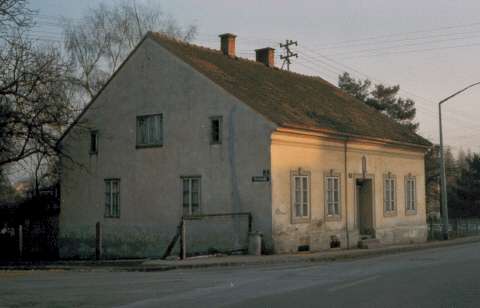
1899 The Hitler family moves into the Leonding residence near Linz—known as the "garden house" because it is situated on a full acre of land and is surrounded by orchards. Alois Hitler sets up his beehives. Adolf will hereafter consider Linz his home town and refer to it as the most "German" of Austrian cities. [For further details, Click here.]

1903 Guantanamo: President Roosevelt signs an agreement with Cuba to lease Guantanamo Bay for 2,000 pieces of gold per year. Note: The US continues to pay the lease every year, but the Castro government consistently refuses to accept the payment.
1904 Birth: William L. Shirer: American journalist, historian and novelist:
William Lawrence Shirer was an American journalist and historian. He became known for his broadcasts on CBS from the German capital of Berlin through the first year of World War II.
Shirer first became famous through his account of those years in his Berlin Diary (published in 1941), but his greatest achievement was his 1960 book, The Rise and Fall of the Third Reich, originally published by Simon & Schuster. This book of well over 1000 pages is still in print, and is a detailed examination of the Third Reich filled with historical information from German archives captured at the end of the war, along with impressions Shirer gained during his days as a correspondent in Berlin. [For further information, click here.]
1908 Early days in Vienna:
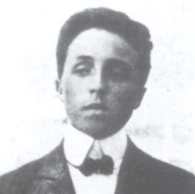
August Kubizek arrives in Vienna on the six o'clock train, and is met on the platform by his jubilant friend. Adolf Hitler, wearing a wide-brimmed hat, trench coat and ivory-handled walking stick, helps lug Kubizek's luggage across the Mariahilferstrasse to number 29 Stumpergasse. After consuming some of the ham, roast pork, cheeses, and other foodstuffs Augusts mother had sent him off with, Adolf insists on showing the weary traveler the sights. With continuous, enthusiastic commentary, Adolf drags him first to the Court Opera House, then to St. Stephens Cathedral, and finally the Maria am Gestade Church. It is one o'clock in the morning before they find themselves back in Adolf's tiny, kerosene-scented room.
Though Adolf continues to attempt to maintain the fiction that he is taking classes at the Academy, it soon becomes obvious to Kubizek that he is not. When he brings the subject up with him, Hitler's rage is great. He rails against the "fossilized bureaucrats" holding back his genius, blaming the world for his misfortune. Henceforth, Kubizek will avoid the subject.
His friend is, in fact, embarked upon a course of self-directed education. He consumes more time studying than that typically spent by the average full-time student. A card-carrying subscriber to the superb Hofburg Library, Hitler will spend many hours each day, and long into the night, reading. He rapidly consumes the printed page, skimming over that which he does not find useful or interesting, and absorbs that which he does, with what seems to be something approaching 100% retention. A prodigious memory is perhaps the future Fuehrer's greatest intellectual asset. He developed the capacity to recite, with precision, a vast profusion of facts and figures taken in decades earlier. Added to the continuing evolution of his ability to express himself, this will at times leave future opponents and colleagues defenseless. [For further details, Click here.]
1915 Various:
World War I: A German battle cruiser squadron under Vice Admiral Franz von Hipper moves out to raid the English coast and harass the British fishing fleet. "Hipper often lurked in the dangerous North Sea with his Battlecruiser Squadron, and met with success during raids in the early stages of the war.
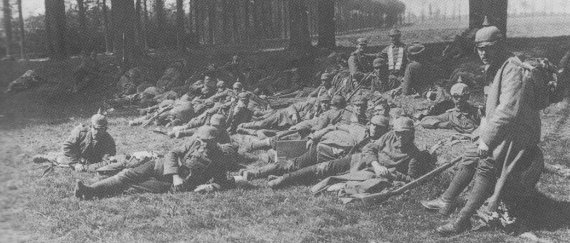
World War I: Gefreiter Adolf Hitler's 16th RIR [List Regiment] is pulled out of the front line for a well-earned two weeks rest. Hitler uses some of this free time to write a long, autobiographical letter (The Hepp Letter) to his lawyer and friend, Ernst Hepp:
I am sorry, I will have to close now. The really important thing for me is to keep thinking about Germany. From eight in the morning to five in the afternoon, day after day, we are under heavy artillery fire. In time, even the strongest nerves are shattered by it. I keep thinking about Munich, and there is not one man here who isn't hoping that we shall soon finish off this rabble once and for all, make mincemeat of them, at whatever the cost. The hope is that those of us, who have the good fortune to see our homeland again will find it purer and less corrupted by foreign influence. The sacrifices and misery exacted daily from hundreds of thousands of people, the rivers of blood flowing every day against an international world of enemies will, we hope, result in smashing Germany's external enemies, and bring about the destruction of our internal internationalism. That would be better than any territorial gains. As for Austria, it will come about as I have already told you. [For further details, Click here.]
1917 World War I: Germans begin withdrawal to the Hindenburg Line:
German troops begin a well-planned withdrawal‑-ordered several weeks previously by Kaiser Wilhelm‑-to strong positions on the Hindenburg Line, solidifying their defense and digging in for a continued struggle on the Western Front in World War I.
One month after Paul von Hindenburg succeeded Erich von Falkenhayn as chief of the German army's general staff in August 1916, he ordered the construction of a heavily fortified zone running several miles behind the active front between the north coast of France and Verdun, near the border between France and Belgium. Its aim would be to hold the last line of German defense and brutally crush any Allied breakthrough before it could reach the Belgian or German frontier. The British referred to it as the Hindenburg Line, for its mastermind; it was known to the Germans as the Siegfried Line.
In the wake of exhausting and bloody battles at Verdun and the Somme, and with the U.S edging ever closer to entering the war, Germany's leaders looked to improve their defensive positions on the Western Front. The withdrawal to the Hindenburg Line meant that German troops were removed to a more uniform line of trenches, reducing the length of the line they had to defend by 25 miles and freeing up 13 army divisions to serve as reserve troops. On their way, German forces systematically destroyed the land they passed through, burning farmhouses, poisoning wells, mining abandoned buildings and demolishing roads.
The German command correctly estimated that the move would gain them eight weeks of respite before the Allies could begin their attacks again; it also threw a wrench into the Allied strategy by removing their army from the very positions that British and French joint command had planned to strike next. After the withdrawal, which was completed May 5, 1917, the Hindenburg Line, considered impregnable by many on both sides of the conflict, became the German army's stronghold. Allied armies did not break it until October 1918, one month before the armistice. (History.com)
1918 World War I: Lenin's Address Urging Acceptance of the Brest-Litovsk Peace Treaty:
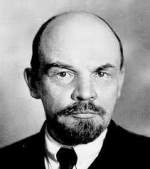
The German reply offers peace terms still more severe than those of Brest-Litovsk. Nevertheless, I am absolutely convinced that to refuse to sign these terms is only possible to those who are intoxicated by revolutionary phrases. Up till now I have tried to impress on the members of the party the necessity of clearing their minds of revolutionary cant. Now I must do this openly, for unfortunately my worst forebodings have been justified. Party workers in January declared war on revolutionary phrases, and said that a policy of refusal to sign a peace would perhaps satisfy the craving for effectiveness‑-and brilliance‑-but would leave out of account the objective correlation of class forces and material factors in the present initial moment of the Socialist revolution. They further said that if we refused to sign the peace then proposed more crushing defeats would compel Russia to conclude a still more disadvantageous separate peace.
1920 The Netherlands refuses to surrender ex-Kaiser Wilhelm II of Germany to the Allies:
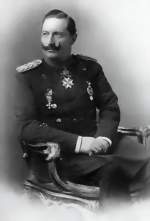
Wilhelm was forced to abdicate and went into exile in the Netherlands. Attempts by the victorious allies to extradite and try him for war crimes came to nothing. With Hitler's rise to power Wilhelm had hopes of being restored.
1932 Various:
Soviet Union and Finland conclude a non-aggression pact. (Chronology of Finnish history)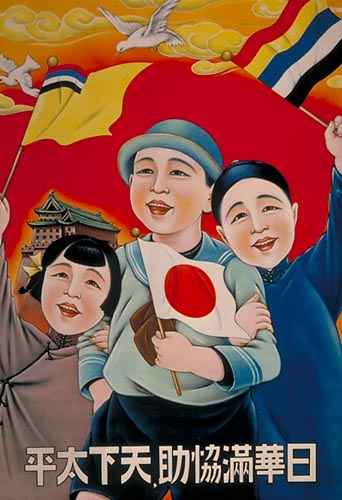
The recent events which have taken place in China, especially the hostilities which having been begun in Manchuria have latterly been extended to Shanghai, far from indicating the advisability of any modification of the treaties we have been discussing, have tended to bring home the vital importance of the faithful observance of the covenants therein to all of the nations interested in the Far East. It is not necessary in that connection to inquire into the causes of the controversy or attempt to apportion the blame between the two nations which are unhappily involved; for regardless of cause or responsibility, it is clear beyond peradventure that a situation has developed which cannot, under any circumstances, be reconciled with the obligations of the covenants of these two treaties. [See: Countdown to Infamy: Timeline to Pearl Harbor.]
1936 Holocaust: Senator William H. King urges the US to open its doors as a haven for Jews fleeing Germany.
1937 USSR: The trial of 17 leading Communists begins in Moscow after they are accused of involvement in a plot led by Leon Trotsky to overthrow the regime and assassinate its leaders.
1938 Adolf Hitler addresses his Senior Officers concerning his future plans. (Notes)
1940 Church and Reich: Vatican Radio broadcasts excerpts from Cardinal Hlond's January 6 report to the Pope. (See January 6) ( THP)
1941 Various:
World War II: From official notes of the German naval war staff: "Instruction from Supreme Command, Armed Forces (OKW) that seizure of Malta is contemplated for the fall of 1941 after the execution of Barbarossa."
World War II: Romania: In Bucharest, Legionary resistance ends before 8 AM, and in the provinces, prior to 11 AM. Nevertheless, Antonescu's forces stage a massacre of peaceful crowds in Bucharest. At least 360 are killed including many women and children. No Legionaries are killed, they have already peacefully withdrawn on Sima's orders, as agreed. Trials and executions of other Legionaries are commonplace until June. (THP)
Plutonium is first chemically identified by chemist Glenn T. Seaborg and his team at the University of California, Berkeley. [For further information, click here.]
1942 Various:
Yugoslavia: Hungarian Fascists at Novi Sad in occupied Yugoslavia drive 550 Jews and 292 Serbs to the river and onto the ice. After firing on the ice to break it up, they shoot all those who manage to stay afloat. A total of 2,550 Serbs and 700 Jews are killed by the Hungarians at Novi Sad. (THP)
World War II: FDR to Stalin:
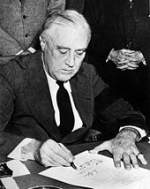
I would like you to know that in due course we will be glad to revise with you our agreement on the funds advanced by us under the Lend-Lease Act. At the moment the prime task is delivery of supplies to you. I have given directions to study your proposal for centralizing here munitions deliveries to Russia. We are greatly encouraged by the latest news of the successes of your Army. I send you warm congratulations on the 24th anniversary of the Red Army.
Death: Boris Vilde, linguist:
On this date, Estonian linguist and ethnographer Boris Vilde was shot with his French Resistance circle at Fort Mont-Valerien.
St. Petersburg-born, Estonian-raised, the young scientist came to Paris at age 25 (French link) with his life in a backpack. In the eight short years remaining to him before he gave his life for his adopted land's anti-Nazi resistance, Vilde cofounded the Paris Musee de l'Homme. (When visiting, be sure to look for the skull of Suleiman al-Halabi, a Syrian executed for assassinating one of Napoleon's Egyptian officers in 1800.) . . . .
His Musee de l'Homme group recruited scientists and intellectuals and published anti-fascist propaganda. When the Vichy government infiltrated it and had its principals condemned, one of Vilde's compatriots is said to have bellowed at the firing squad at the last moment: "Imbeciles, it's for you, too that I die."
1943 World War II: Various:
Resistance: Underground Broadside:
On January 22, 1943, six months will have passed since the deportations from Warsaw began. We all remember well the days of terror during which 300,000 of our brothers and sisters were cruelly put to death in the death camp of Treblinka. Six months have passed of life in constant fear of death, not knowing what the next day may bring. We have received information from all sides about the destruction of the Jews in the Government-General, in Germany, in the occupied territories. When we listen to this bitter news we wait for our own hour to come, every day and every moment. Today we must understand that the Nazi murderers have let us live only because they want to make use of our capacity to work to our last drop of blood and sweat, to our last breath. We are slaves. And when the slaves are no longer profitable, they are killed. Every one among us must understand that, and every one among us must remember it always.
During the past few weeks certain people have spread stories about letters that were said to have been received from Jews deported from Warsaw, who were said to be in labor camps near Minsk or Bobruisk. Jews in your masses, do not believe these tales. They are spread by Jews who are working for the Gestapo. The bloodstained murderers have a particular aim in doing this: to reassure the Jewish population in order that later the next deportation can be carried out without difficulty, with a minimum of force and without losses to the Germans. They want the Jews not to prepare hiding-places and not to resist. Jews, do not repeat these lying tales. Do not help the [Nazi] agents. The Gestapo's dastardly people will get their just deserts.
Jews in your masses, the hour is near. You must be prepared to resist, not to give yourselves up like sheep to slaughter. Not even one Jew must go to the train. People who cannot resist actively must offer passive resistance, that is, by hiding. We have now received information from Lvov that the Jewish Police there itself carried out the deportation of 3,000 Jews. Such things will not happen again in Warsaw. The killing of Lejkin proves it. Now our slogan must be: Let everyone be ready to die like a man! January 1943." [See: Jewish War Heroes.]
Stalingrad: The last German aircraft flies out of the pocket: a Heinkel III carrying nineteen wounded and seven bags of mail. From now on, all supplies have to be air-dropped. [See: Was Adolf Hitler a 'Great' Military Leader?]
From the newspaper Dernieres Nouvelles de Strasbourg:
In his speech at Karlsruhe, Gauleiter Robert Wagner stressed that measures of total mobilization would be applied to Alsace and that the authorities would abstain from any bureaucratic working method. The Alsatian labor offices have already invited the first category of young women liable for mobilization to fill out the enlistment form. In principle, all women who until the present have worked only at home, who have had to care only for their husbands, and who have no other relatives, shall work a full day. Many married men who until now had never offered to help their wives with the household work will be obliged to put their shoulder to the wheel. They will work in the household and do errands. With a little goodwill, everything will work out. Women who have received a professional education shall be put, if possible, to tasks that relate to their professions, on condition that they have an important bearing on the war effort. This prescription applies only to all feminine professions which imply care given to other persons.
North Africa: British forces under Field Marshal Montgomery capture Tripoli, Libya:
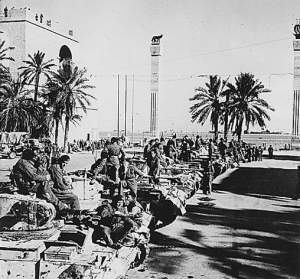
Much has been written about the remarkable effect Montgomery had on the troops, his appearance in peculiar hats, and so on. This was superficial. We judged him on results and his manner of achievement. Many of the troops never saw him: our first encounter was months later at Tripoli. Yet the signs of a new grip on affairs was palpable, as Churchill noticed. There was the first of those special messages to the troops. These were printed on sheets, some 11 inches by 8 inches, and were widely circulated. The first gave the gist of the famous address to the staff. We were going to fight where we stood. There would be no withdrawal, no surrender. We had to do our duty so long as we had breath in our bodies.
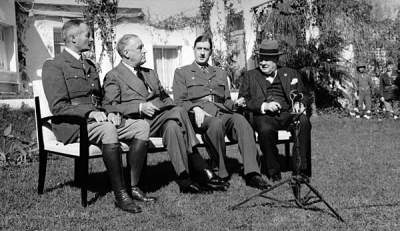
Casablanca: After nine days of talks, President Franklin D. Roosevelt and British Prime Minister Winston Churchill agree to put an invasion of Italy ahead of opening a second front in northwestern Europe. [See: Why Was Churchill Against the D-Day Invasion?]
1945 World War II: Various:
U.S. flag raised on Iwo Jima:
On this day, during the battle for Iwo Jima, U.S. Marines raise the American flag atop Mt. Suribachi, the highest point on the island of Iwo Jima and a key strategic point. Later, Marine commanders decide to raise a second, larger flag, an event which an Associated Press photographer captured on film. The resulting photograph became a defining image of the war.
The amphibious landings of Marines, after severe and relentless bombing of the island, began the morning of February 19, 1945, as the secretary of the navy, James Forrestal, accompanied by journalists, surveyed the scene from a command ship offshore. As the Marines made their way onto the island, seven Japanese battalions opened fire on the 9,000 Marines headed for them. By that evening, more than 550 Marines were dead and more than 1,800 were wounded.
In the face of such fierce counterattack, the Americans reconciled themselves to the fact that Iwo Jima could be taken only one yard at a time. A key position on the island was Mt. Suribachi, the center of the Japanese defense. The 28th Marine Regiment closed in and around the base of the volcanic mountain at the rate of 400 yards per day, employing flamethrowers, grenades, and demolition charges against the Japanese hidden in caves and pillboxes (low concrete emplacements for machine-gun nests). Approximately 40 Marines finally began a climb up the volcanic ash mountain, which was smoking from the constant bombardment, and at about 10 a.m. on February 23, a half-dozen Marines raised a small American flag on the peak—but not before disposing of a Japanese officer who attempted to prevent them. With Mt. Suribachi claimed, one-third of Iwo Jima was under American control. This first flag-raising was photographed by Marine photographer Sgt. Louis R. Lowery. On Lowery's way down Mt. Suribachi, he ran into AP photographer Joe Rosenthal and two other Marine photographers, PFC Bob Campbell and PFC Bill Genaust, who was shooting movies, informing them that the flag-raising they were looking for had already occurred, but encouraging them to check out the view from the top of the hill. The three men continued up the volcano.
Once atop Mt. Suribachi, Rosenthal attempted but was unable to find the soldiers involved in the first flag-raising, deciding instead to photograph the second flag-raising, which featured a much bigger and more photogenic Stars and Stripes. Lowery's film was sent back to military headquarters for processing via ordinary army post—and took a month to arrive. Rosenthal's film was sent by seaplane to Guam, and sent from there via radio-photo to the United States. The photograph so impressed President Roosevelt that he ordered the men pictured in it to return home for a publicity tour. Rosenthal later won a Pulitzer Prize for the photo, but for years was forced to deny erroneous reports that he personally staged the second flag-raising and attempted to pass it off as the original.
Although the famous photograph has long led people to believe that the flag-raising was a turning point in the fight for Iwo Jima, vicious fighting to control the island actually continued for 31 more days. (History.com)
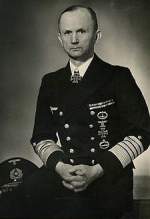
Karl Doenitz launches Operation Hannibal. [See: The Last Days of the Third Reich.]
War in the Air: Bombing of Pforzheim:
During the latter stages of World War II, Pforzheim, a town in southwestern Germany, was bombed a number of times. The largest raid, and one of the most devastating area bombardments of the war was carried out by the Royal Air Force (RAF) on the evening of February 23, 1945. As many as 17,600 people, or 31.4% of the town's population, were killed in the air raid. About 83% of the town's buildings were destroyed, two-thirds of the complete area of Pforzheim and between 80 and 100% of the inner city.

1946 Nuremberg Tribunal: Defense Application for Witnesses and Documents: Professor Dr Franz Exner, Counsel for Defendant Alfred Jodl:
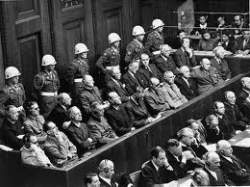
May it please the Court, I take the liberty of adding something for the specific reason that there is danger that evidence may be refused which is of crucial importance for my client also. It concerns evidence which will show that War Crimes and violations of international law were committed by the other side too. The Prosecutor has said that this is irrelevant as far as we are concerned here in this Trial. The Defense certainly does not think of making defendants of the prosecutors, but this point is certainly not irrelevant, specifically because: First, it has to do with the concept of retaliation in international law. Retaliation justifies an action which under normal circumstances would be illegal. That is to say, retaliation then has this significance when the individual action is the answer to a violation of international law committed by the other side. If, therefore one wants to justify one's own action from the point of view of retaliation — one can only do so by proving that violations of law have preceded it on the other side. [For the full text of today's proceedings, Click here.]
1955 Cold War: First council meeting of SEATO:
In the first council meeting of the Southeast Asia Treaty Organization, Secretary of State John Foster Dulles declares the United States is committed to defending the region from communist aggression. The meeting, and American participation in SEATO, set the stage for the U.S. to take a more active role in Vietnam. [For further details, Click here.]
1981 Spanish rebels storm Parliament:
In Spain, Lieutenant Colonel Antonio Tejero and 200 members of the civil guard burst into the Cortes, Spain's legislature building, in Madrid, firing shots into the air as they take the democratic government of Spain hostage. The right-wing conspirators, resentful of the rapid pace of democratic reform since the death of dictator Francisco Franco, called for an all-out military revolt.
The future of Spain was held in suspense into the night as citizens watched the tense events unfold on live television. The coup was only foiled when King Juan Carlos, who succeeded Franco in 1975 and then gave up power to Parliament, successfully appealed to the Spanish military to remain loyal to the constitution and join him in condemnation of the rebels. At noon on February 24, the coup was called off after 18 hours, and Spain's fragile new democracy was preserved.
1997 Various:
Holocaust: Switzerland: The Swiss government, three banks and some businesses agree to set up a private sector humanitarian fund for Nazi Holocaust victims and their heirs. Reportedly, the neutral Swiss profited from millions of dollars worth of gold deposited some fifty years earlier by victims of the Holocaust. It seems that the gold was also used to make deals with the Nazis.
Schindler's List shown uncut on network television:
On this day in 1997, an estimated 65 million people tune in to watch all or part of Steven Spielberg's Oscar-winning Holocaust drama Schindler's List on the NBC television network.
Starring Liam Neeson, Ralph Fiennes and Ben Kingsley, Schindler's List (1993) told the true story of a wealthy German industrialist who helped a group of Polish Jews escape the Nazi concentration camps during World War II. Spielberg shot the great majority of the film in black and white, which only increased the shocking impact of its content. At the Academy Awards that year, the film won Oscars in seven categories, including Best Director and Best Picture. It was also a commercial success, grossing almost $100 million in the United States and more than $300 million worldwide.
On February 23, 1997, NBC broadcast the film in its three-and-a-half-hour entirety, uncut and uninterrupted by commercials, as per Spielberg's request. The network made some effort to warn viewers about the film's mature content, airing a message from Spielberg himself cautioning that the content was not appropriate for young viewers. Still, the number of viewers who watched Schindler's List at home that night was more than double the number who watched it in the theater when it was released in 1993. The next day, while addressing the National Association of Broadcasters, Federal Communications Commission (FCC) Chairman Reed Hunt praised NBC's showing of the film, stating that it "showed us again the power and glory of broadcast TV."
Controversy arose the following day, however, when Senator Tom Coburn, Right-Wing Republican of Oklahoma, issued a release blasting NBC for airing the uncut film, saying it had taken network television "to an all-time low, with full-frontal nudity, violence and profanity" and that it should not have aired the movie "on a Sunday evening during a family time." Coburn, head of the conservative Congressional Family Caucus, brought on a firestorm of negative publicity with his remarks, drawing criticism from fellow conservatives, such as William Bennett and Jack Kemp, as well as from Democrats. Coburn later issued an apology on CNN, stating that he thought the movie should have been aired, just in a later time slot. "I think that at that time of the evening there are still large numbers of children watching without parental supervision," Coburn explained. (History.com)
Edited by Levi Bookin (Copy editor)
levi.bookin@gmail.com



Click to join 3rdReichStudies

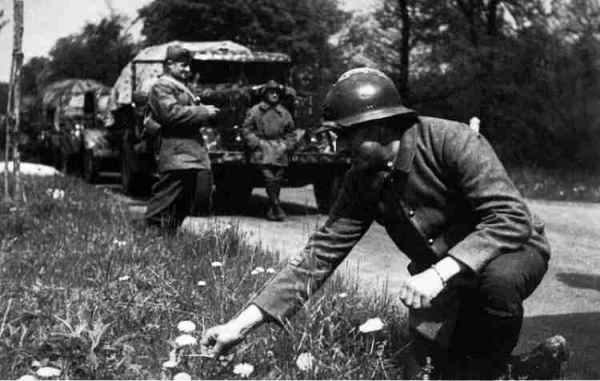
FAIR USE NOTICE: This site may contain copyrighted material the use of which has not always been specifically authorized by the copyright owner. We are making such material available in our efforts to advance understanding of historical, political, human rights, economic, democracy, scientific, environmental, and social justice issues, etc. We believe this constitutes a 'fair use' of any such copyrighted material as provided for in section 107 of the US Copyright Law. In accordance with Title 17 U.S.C. Section 107, the material on this site is distributed without profit to those who have expressed a prior interest in receiving the included information for research and educational purposes. If you wish to use copyrighted material from this site for purposes of your own that go beyond 'fair use', you must obtain permission from the copyright owner.
Please note that the list-owner and the moderator are not responsible for, and do not necessarily approve of, the random ads placed on our pages by our web server. They are, unfortunately, the price one pays for a 'free' website.